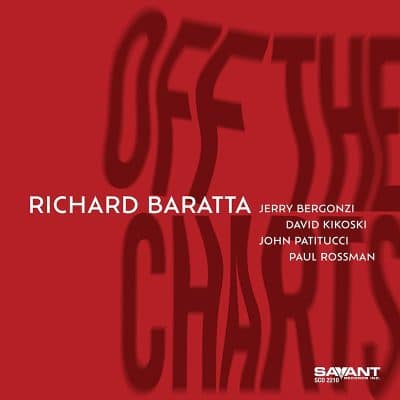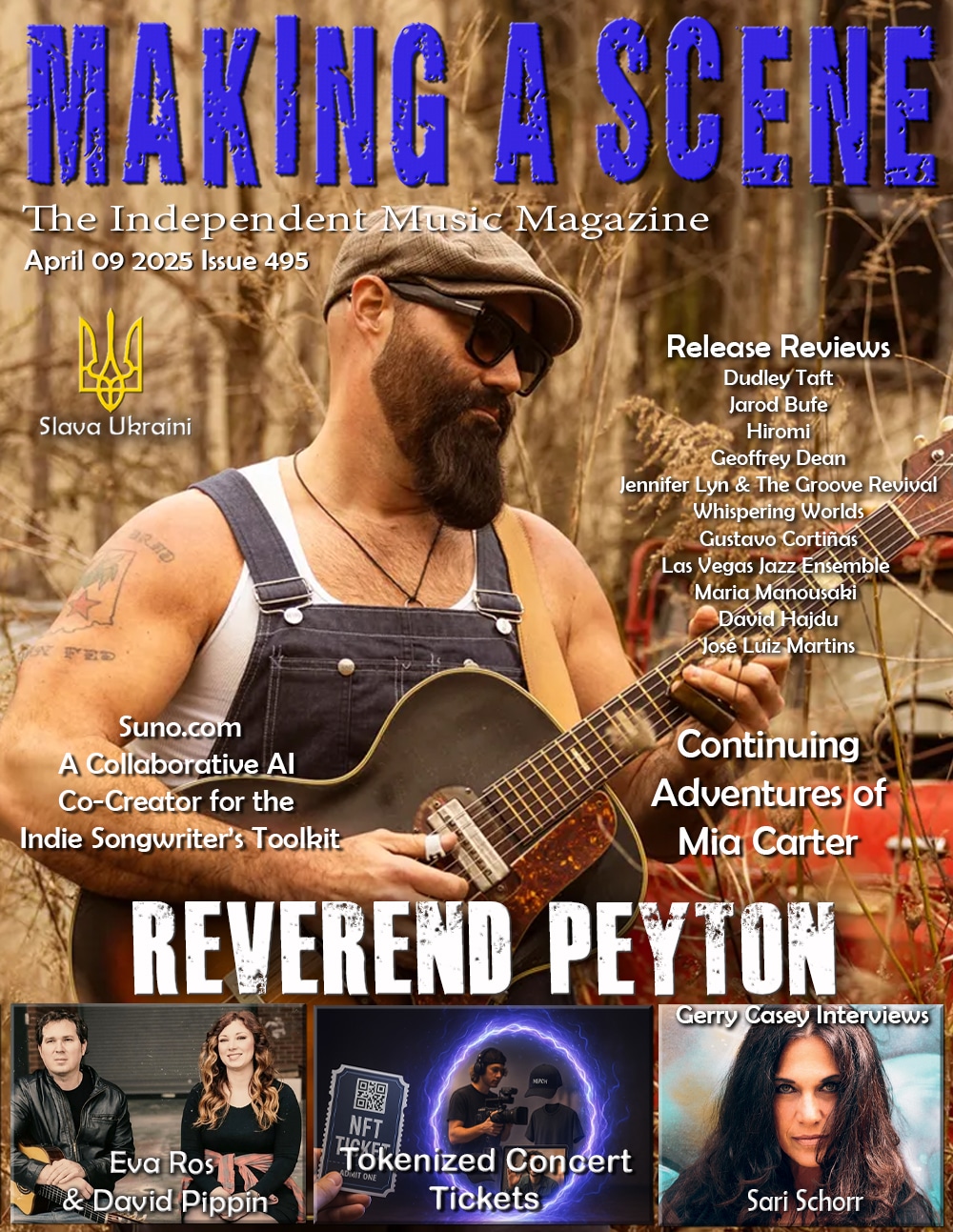Richard Baratta Off the Charts
 Richard Baratta
Richard Baratta
Off the Charts
Savant
We’ve covered film producer and drummer Richard Baratta’s previous two releases here that were both focused on movie music compositions. On Off the Charts he casts aside that successful formula in favor of music that inspired him while growing up. Instead of choosing highly recognizable fare however, he instead, as the title suggests, turns to lesser-known pieces from some of his favorite jazz composers and performers. He assembled a tight combo of premiere players to realize this vision, with a core piano trio of the versatile David Kikoski and esteemed bassist John Patitucci. Augmenting these three are percussionist Paul Rossman and tenor saxophonist Jerry Bergonzi who appears on five of the nine tracks.
Baratta’s playlist stems from the 60’s and 70’s with wonderful but overlooked titles from terrific composers such as Bobby Hutcherson, McCoy Tyner, Joe Henderson, Wayne Shorter, Charles Lloyd, and Chick Corea. He even found one from one of this writer’s favorites, Joe Farrell. Sadly, the only composer who is still with us is the indefatigable Charles Lloyd, but the vibrant, energetic sounds of these compositions live on as Baratta and his ensemble refresh them. The full quintet opens with Hutcherson’s “Herzog” from the vibraphonist’s 1969 Blue Note Total Eclipse. The unit sets a blistering tempo with Kikoski running up and down the ivories and Bergonzi reaching deep into his horn. These cats are swinging hard from the first few notes. Baratta takes his obligatory turn on the eights in three flourishes before they take it out.
“Molten Glass” is from Joe Farrell Quartet, a 1971 CTI release that featured a super group of players, Chick Corea, Dave Holland, John McLaughlin, and Jack DeJohnette backing the multi-reedist Farrell. It’s a bossa-tinged tune, with bassist Patitucci featured in this rendering. The ballad “Blackberry Winter” is from the jazz pianist Alec Wilder and lyricist Loonis McGlohon and was recorded by Keith Jarrett as well as by several vocalists in the late ‘70s. Bergonzi’s lyricism and Kikoski’s lush solo highlight this gorgeous piece while the leader takes to the brushes. Pianist Kikoski gleams kinetically on McCoy Tyner’s “Peresina” while percussionist Rossman’s congas give it the requisite Latin feel. The tune dates to Tyner’s Expansions (Blue Note, 1970). Kikoski and Patitucci both go electric for Henderson’s funky “Afro-Centric: from his Power to the People (Milestone, 1970), one of the rare occasions where Ron Carter played electric bass, acknowledged respectfully here by Patitucci. Of course, we hear Bergonzi on most of these pieces composed by saxophonists and he blows forcefully here spurred on by the rhythms of the bassist, percussionist, and leader, culminating in an infectious vamp toward the end.
Wayne Shorter’s “Lost” (from The Soothsayer, Blue Note, 1979), curiously finds Bergonzi sitting it out as the band pares down to a piano trio to render the mysterious, rather contemplative piece. Patitucci, a longtime member of the Wayne Shorter Quartet delivers a trademark pizzicato solo and the interplay between the pianist, bassist, and drummer Baratta is quite impressive. The bassist leads into Charles Lloyd’s highly percussive “Sombrero Sam,” where Bergonzi returns, delivering his most aggressive performance on the disc. Baratta’s work on the kit, especially the cymbals is noteworthy as well. The tune has been recorded many times but first appeared in 1966 on the Atlantic recording, The Charles Lloyd Quartet, another legendary ensemble comprised of Keith Jarrett, Jack DeJohnette, and Cecil McBee.
“Tones for Joan’s Bones” is the titular track of Chick Corea’s first album as a leader, recorded in 1966 but not released until 1968 on Vortex. Like so many here, it featured a legendary supporting cast of trumpeter Woody Shaw, tenorist Joe Farrell, bassist Steve Swallow, and drummer Joe Chambers. This swinging version shows off the trio once again, with Kikoski moving with liquid speed and fluidity on the acoustic piano. With a premiere saxophonist in tow, it would be difficult to deliver an album of ‘60s covers without nodding to John Coltrane, and indeed the full quintet closes this superb session with the intense and Afro-Latin infused “Out of This World,” written by Harold Arlen and Johnny Burke, having first appeared in Coltrane’s repertoire on Coltrane (GRP, 1962).
Moving away from the film menu proves successful for Baratta who couldn’t possibly miss with these talented players. He comments, “…I really wanted to encompass many different kinds of music, from loose jazz to straight-ahead sounds to Latin grooves to funk-rock. Those were the elements that were in play in the ‘60s and ‘70s. So rather than work with one particular style, I wanted to be faithful to that time period and my experiences by exploring all of them.” Maybe this will give you the impetus to do the same. Have at it.
- Jim Hynes
Buy Us a Cup of Coffee!
Join the movement in supporting Making a Scene, the premier independent resource for both emerging musicians and the dedicated fans who champion them.
We showcase this vibrant community that celebrates the raw talent and creative spirit driving the music industry forward. From insightful articles and in-depth interviews to exclusive content and insider tips, Making a Scene empowers artists to thrive and fans to discover their next favorite sound.
Together, let’s amplify the voices of independent musicians and forge unforgettable connections through the power of music
Make a one-time donation
Make a monthly donation
Make a yearly donation
Buy us a cup of Coffee!
Or enter a custom amount
Your contribution is appreciated.
Your contribution is appreciated.
Your contribution is appreciated.
DonateDonate monthlyDonate yearlyYou can donate directly through Paypal!
Subscribe to Our Newsletter
Discover more from Making A Scene!
Subscribe to get the latest posts sent to your email.













































